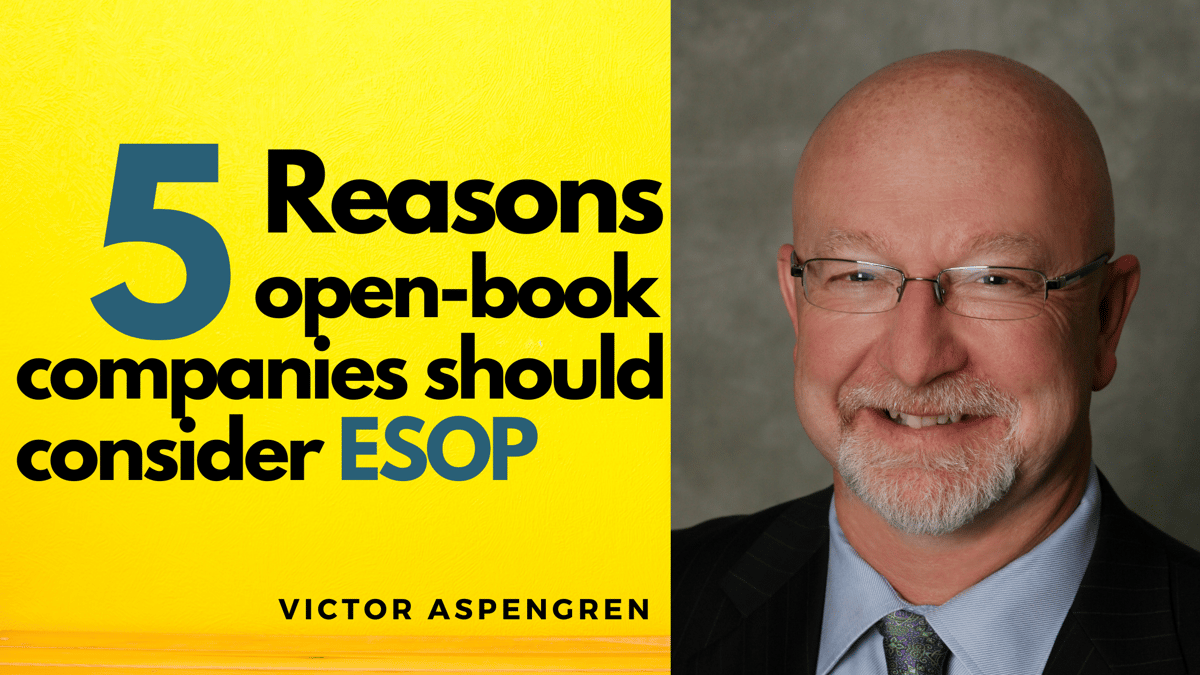
Liquidity options are plentiful for business owners: strategic sale, private equity, management buyout, family transfer, and leveraged recapitalization. Which path should you take?
We know that 42% of the 2021 Great Game™ All-Star companies and many others walked a different path—implementing an Employee Stock Ownership Plan (ESOP). Apart from the fact that ESOPs can be a great exit strategy for open-book companies, here are the top five reasons why open-book management companies should consider an ESOP.
<<Check out an ESOP Roundtable facilitated by Victor on our "Change the Game" Podcast>>
1. Cultural Familiarity
Employees want their passion and commitment to be reflected in the brand—it’s an open-book company’s DNA. One of the most challenging aspects of becoming an ESOP company is engaging employees and getting them to understand what it means to be “employee-owned”.
Successful ESOP companies have employees who understand how their day-to-day contributions impact the company. Most open-book management companies already have engaged employees that are excited about the future of their business, and employee ownership is a natural evolution in open-book culture.
2. Independence
There are polarizing viewpoints on companies selling strategic buyers or private equity. Some believe that strategic buyers will pay the highest value for a business, while others feel that “selling out” will potentially damage the reputation and diminish the company’s brand appeal.
An ESOP allows owners the opportunity to monetize all of those years of hard work while keeping the company in the hands of the individuals that helped to build it. After all, isn’t your independence part of the reason you have come this far?
Take note: the ESOP is incapable of running any business; it is simply a vehicle to transition ownership to employees in a very tax-advantaged way.
3. Controllable Liquidity
An ESOP can be structured to meet a variety of needs for a liquidity event. Depending on the ownership structure or owner timeline, a full sale may not be practical or desired. An ESOP can provide partial liquidity to one or several shareholders. As a result, an ESOP is an excellent option for multi-shareholder situations where one owner is seeking liquidity while others want to retain control.
Also, nothing precludes you from implementing a minority ESOP today with plans to sell the company to a strategic buyer at some point in the future (i.e. win-win for both owners and employees).
4. Strong Market Environment
A robust financial market exists for leveraged ESOPs as lenders see the industry expanding and there is a near-zero default rate in investments. ESOPs are becoming more popular as awareness of their benefits grows. Regardless of your size, an ESOP is a great solution for owners who want to remain independent and create liquidity at the same time.
5. Employee Attraction and Retention
Retention and attraction of employees is critical to creating a sustainable business. This is particularly relevant to an open-book management company, where many believe their people are their most important asset. An ESOP provides this attraction and retention mechanism by giving all eligible employees an equity interest in the company. ESOPs are designed to reward employees who stay with the company for a long time (i.e., 10 years or longer). The ESOP benefit can be a powerful supplement to an employee’s overall retirement savings.
As awareness increases, it is anticipated that more companies will turn to this succession planning strategy that offers a win-win for owners and employees. Employee ownership may not be the right option for everybody, but when all things are considered, ESOPs present a very compelling tax effective exit strategy that can balance the changing of ownership with the maintaining of control.
For more information on ESOP's, download our new white paper, Five Rules For Building A True Ownership Culture Inside An Employee-Owned Company, at greatgame.com/ownershipculture.
Other Articles You Might Like:
.png)








.png)




-5.png)
.png)
